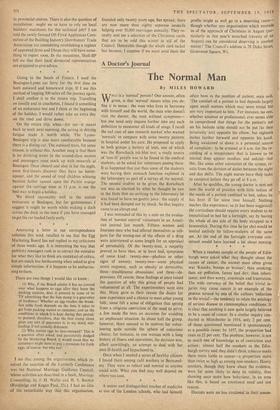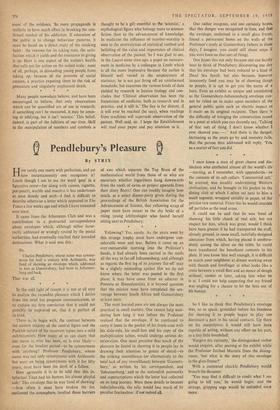A Doctor's Journal
The Normal Man
By MILES HOWARD WHAT is a 'normal' person? One answer, often given, is that 'normal' means what you de- fine it to mean : the man who lives in harmony with himself and the world, the man who doesn't visit the doctor, the man without symptoms— but one need only inquire further into any such definition to encounter all kinds of snags. I recall the sad case of one research worker who wanted 'normals' to compare with some twenty patients in hospital under his care. He proposed to apply to both groups a battery of tests, one of which was the Rorschach ink-blot test; a ready source of `non-ill' people was to be found in the medical students, so he asked for volunteers among these. It so happened that just then some of the students were having their stomach function explored in the laboratory as part of a survey of the normal. The second student to be given the Rorschach test was so, alarmed by what he thought he -saw in the blots that on arriving in the laboratory he was found to have no gastric juice : the supply of it had been damped out by shock. So that inquiry came to an abrupt end.
I was reminded of this by a note on the evalua- tion of 'normal control' volunteers in an Ameri- can journal last month. Fifteen women and fourteen men who had offered themselves as sub- jects for the testing-out of the effects of a drug were interviewed at some length for an appraisal of personality. Of the twenty-nine, a majority proved to have then, or to have had, symptoms of some kind : twenty-one—phobias or other signs of anxiety; twenty-two—some physical stress response, such as obesity or dermatitis; three—troublesome obsessions; and three—de- pressions. Of course, these findings at once raised the question of why this group of people had volunteered at all. The experimenters went into this. Many gave as their reason the desire for new experience and a chance to meet other young folk; some felt a sense of obligation that sprang from a. religious conviction of the need to serve; a few made the tests an occasion for avoiding an unpleasant situation. In about half the group, however, there seemed to be motives for volun- teering quite outside the sphere of conscious choice; for instance, in one woman with a long history of illness and operations, the decision was, albeit unwittingly, an attempt to deal with her own ill-health and hypochondria.
Once when I needed a series of healthy citizens I found them among cafe workers in Bermond- sey. They were as robust and normal as anyone could wish. What you find may well depend on where you look.
A senior and distinguished teacher of medicine at one of the London schools, who had himself often been in the position of patient, once said, `The comfort of a patient in bed depends largely upon small matters which may seem trivial but are very important to him.' For instance, no one, whether amateur or professional, ever seems able to comprehend that things for the patient's use on his bedside table should not be put (as they invariably' are) opposite his elbow, but eighteen inches further forward and opposite his hand. Being awakened at dawn is a perennial source of complaint : to be aroused at 6 a.m. for the re- cording of a temperature that is known to be normal does appear needless and unkind—but this, like some other anomalies of the system, re- sults from the division of duties between the night and day shifts. The night nurses have their tasks to complete before they go off at 8 a.m.
After he qualifies, the young doctor is sent out into the world of practice with little notion of the needs of a patient confined to bed, unless he has been ill for some time himself. Nothing teaches like experience; so (it has been suggested) the curriculum should require every student to be immobilised in bed for a fortnight, say by having the whole of one side of the body strapped to a broomstick. During this time he (or she) would be tended entirely by fellow-students of the same sex. At the end of the fortnight everyone con- cerned would have learned a lot about nursing.
* * *
When a random sample of the people of Edin- burgh were asked what they thought about the causes of cancer, the answer most often given was 'Knocks, bumps or bruises'; then smoking; then air pollution, fumes and dirt; then inheri- tance; and then worry, overstrain and frustration. The wide currency of the belief that trivial in- juries may cause cancer is an example of the process termed by one of the authors 'reduction to the trivial'—the tendency to relate the aetiology of serious disease to commonplace conditions. It is clear that smoking is now quite largely believed to be a cause of cancer. In a similar inquiry con- ducted in Manchester in 1954, only 2 per cent. of those questioned mentioned it spontaneously as a possible cause; by 1957, the proportion had risen to 22 per cent. The problem, however, is not so much one of knowledge as of conviction and action : almost half the smokers in the Edin- burgh survey said they didn't think tobacco made them more liable to cancer—a proportion more than twice as high as among non-smokers. Heavy smokers, though they knew about the evidence, were far more likely to deny its validity, thus showing once more how behaviour, in an area like this, is based on emotional need and not reason.
Doctors were no less irrational in their assess- anent of the evidence. So mere propaganda is unlikely to have much effect in breaking the con- firmed smoker of his addiction. If education of the public is to change behaviour patterns, it must be based on a direct study of the smoking habit : the reasons for its taking root, the satis- faction which it yields and the resistance to giving it up. Here is one aspect of the nation's health that calls out for action on the widest scale : most of all, perhaps, in dissuading young people from taking up, because of the pressure of social custom, a practice exposing them to the risk of premature and singularly unpleasant death.
* * *
Many people nowadays believe, and have been encouraged to believe, that only observations which can be quantified are of use in research; if something can't be measured, it may be amus- ing or edifying, but it isn't 'science.' This belief, indeed, is part of the folklore of our time. Skill in the manipulation of numbers and symbols is thought to be a gift essential to the 'scientist,' a mythological figure who belongs more to science- fiction than to the advancement of knowledge. In medicine the influence of number-worship is seen in the overvalution of,statistical method and belittling of the value and importance of clinical observation of the patient. So I was glad to see, in the Lancet some time ago, a paper on measure- ment in medicine by a colleague in Leeds which is all the more impressive because the author is himself well versed in the employment of statistics; he is not just firing off an uninformed broadside, but examines the various kinds of data yielded by research in human biology and con- cludes that 'Clinical observation has been the foundation of medicine, both in research and in practice, and it still is.' The day is far distant, if it will ever be reached (he says), when readings from machines will supersede observation of the patient. Well said, sir. I hope the Establishment will read your paper and pay attention to'it.



































 Previous page
Previous page